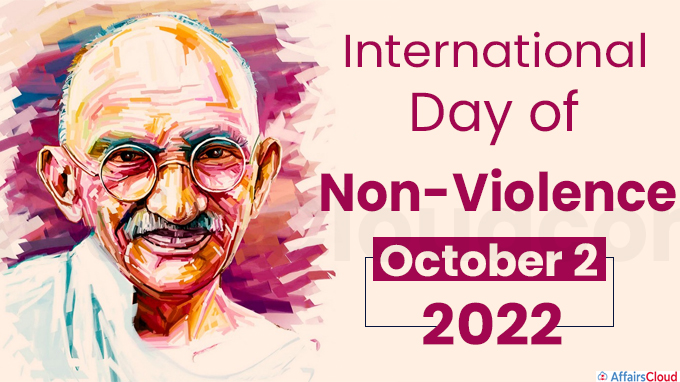
In India, October 2 is observed as Gandhi Jayanthi and this year (2022) marks the 153rd birth anniversary of Mahatma Gandhi.
- The International Day of Non-Violence aims to Say No to Violence which is observed to spread the message of Non-Violence through education and public awareness.
Background:
i. The UN General Assembly (UNGA) adopted the resolution A/RES/61/271 on 15th June 2007 and proclaimed October 2 of every year as International Day of Non-Violence.
- According to the UN, the resolution reaffirms “the universal relevance of the principle of non-violence” and the desire “to secure a culture of peace, tolerance, understanding and non-violence”.
ii. The 1st UN recognised International Day of Non-Violence was observed on 2nd October 2007.
iii. In January 2004, Iranian Noble Laureate Shirin Ebadi proposed the idea for the International Day of Non-Violence.
What is Non-Violence?
i. The principle of Non-Violence rejects the use of physical violence to achieve social or political change.
ii. 3 main categories of Non-Violence Action:
- Protest and Persuasion, including marches and vigils
- Non-cooperation
- Non-violent intervention, such as blockades and occupations.
About Mahatma Gandhi and his Non-Violence:
i. Mahatma Gandhi was born on October 2, 1869, in Porbandar, Gujrat. His full name was Mohandas Karamchand Gandhi later known as Mahatma Gandhi.
ii. Mahatma Gandhi joined the Indian National Congress following in 1915 and took leadership of the congress in 1920. But his 1st presence at a Congress session was in the 1901 session of Congress at Calcutta, West Bengal.
- The major ideologies of Mahatma Gandhi are: Truth and Non-Violence Satyagraha, Sarvodaya, Swaraj, Trusteeship, and Swadeshi.
iii. The term ‘Ahimsa’, advocated by Mahatma Gandhi was used to refer to non-violence which implies total nonviolence, no physical violence, and no passive violence. Whereas, Mahatma Gandhi translates Ahimsa as love.
iv. He led some of the most historic movements in India’s freedom struggle. He led the major non-violent protest action in India, Salt March (Dandi March or Salt Satyagraha) in 1930.
v. He was assassinated by Nathuram Vinayak Godse on 30th January 1948, which is now observed as National Martyr’s Day in India.
Note:
All Bodo Students Union (ABSU), an understudies association of non-political has been observing the international day of nonviolence for more than a decade.
About the United Nations (UN):
Secretary-General- António Guterres
Headquarters- New York, United States.
Establishment- 1945